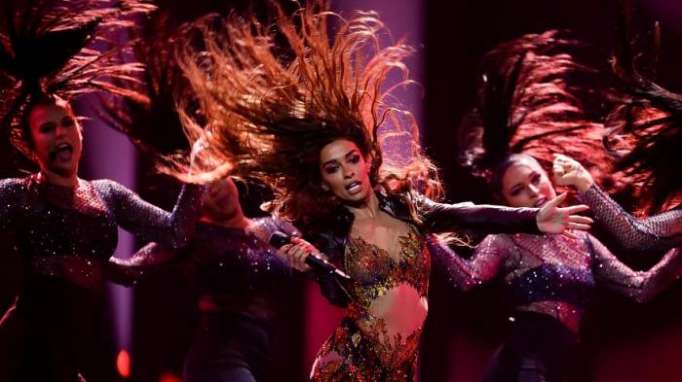Mauboy will represent Australia with her pop ballad We Got Love. She will take to the stage during the second semi-final on Friday.
The Eurovision Grand Final starts 5am on Sunday, May 13 in Australia (AEST) and the next semi final airs on SBS at 5am on Friday, May 11.
There are 26 countries in the final, and another 10 spots are up for grabs later this week on Friday when the second semi-final takes place.
The host country Portugal and the UK, France, Germany, Spain and Italy automatically get a place in the grand final.
Australia’s biggest threat is seen as Norway’s Alexander Rybak.
Countries who didn’t make it past the first semi were Azerbaijan, Iceland, Belgium, Belarus, F.Y.R. Macedonia, Croatia, Greece, Armenia and Switzerland.
It’s the fourth year a competitor from Australia has taken part since Mauboy’s Australian Idol alumni Guy Sebastian became our first entrant in 2015.
This year an equal-record number of 43 countries will take the stage at Altice Arena in Lisbon for the chance to win the coveted Eurovision title.
Who are the main Eurovision contenders?
Australia
Jessica Mauboy has made a strong impression in Portugal with fellow contestants, their minders and organisers loving her song We Got Love and her positive vibes. Her production is bravely minimalistic, with the lighting designed to keep focus on her powerful pipes and contemporary choreography, a real first for Mauboy as a performer. Expect to see plenty of close-ups to counter our pocket Tina Turner getting lost on the massive stage.
Cyprus
Eleni Foureira has smashed into the top rankings since landing in Lisbon and owning the rehearsals with Fuego. Flanked by four ponytailed dancers, Foureira brings one of the sexier pop moments in the 2018 competition both in costume and performance. And she rivals our Jess for this year’s most dramatic hair-whip choreography.
Israel
The short odds have been on Netta to win since her girl power song Toy was revealed. She is quirky as hell, using a looping station to build her vocals against a certified banger and backed by one of the strongest dance ensembles of the 2018 contest. It’s still undecided whether that chicken clucking in the chorus, mocking the “stupid boy” who inspired the song, is genius or nuts.
Norway
Alexander Rybak won Eurovision in 2009. He must have a Dorian Gray picture in his attic because this prodigiously talented pop cutie hasn’t aged a day in nine years. He may be highly rated in the 2018 field but his That’s How You Write A Song entry has already won for the cheesiest lyrics of this year’s compositions. Plus there’s his fiddle choreography. Move over Nigel Kennedy.
France
Madame Monsieur lead the pack of contestants this year bringing social politics to the Eurovision stage. Their stirring Mercy was inspired by the story of a refugee baby plucked from a sinking boat in the Mediterranean and spotlights the current immigration crisis gripping the world.
The Netherlands
Waylon, who last performed in 2014 with the Common Linnets brings Americana to the stage with Outlaw In ‘Em. Yep, a Dutchman performing country rock at Eurovision. Complete with four dudes who start off as miming guitarists and drummer before ditching their instruments to bust out moves as far away from line dancing as you could imagine. It’s completely WTF.
Special mentions go to:
Denmark’s Rasmussen, the Viking barista with a particularly emphatic and earnest delivery of his catchy Higher Ground.
Czech Republic’s Mikolas Josef and his infectious saxy hook-laden Lie To Me. Josef had to cut a backflip out of his choreography after he stacked it in rehearsal and landed in the hospital.
Estonia’s Elena Nechayeva brings the popera to the 2018 contest and while her voice soars, it’s the projections on the dress which steal attention.
Wait, why does Australia compete in a European song contest?
If you’re confused about why Australia is part of it, you’re not alone.
The answer is a mix of goodwill and broadcast rights.
In 2015, Australia was fast-tracked straight to the grand final to compete as a “one-off” special guest for the contest’s 60th anniversary, fitting with the “Building Bridges” theme that year. Guy Sebastian sang for Australia at the finals in Vienna.
The invitation was also a nod to Australia’s loyal fan base since the competition was first aired on Channel 28, what’s now known as SBS, in 1983.
Nearly three million viewers tuned in for the 2017 coverage.
Read the original article on news.com.au.
More about: Eurovision
















































